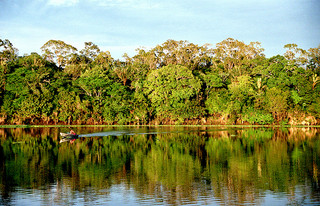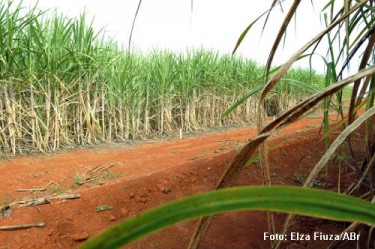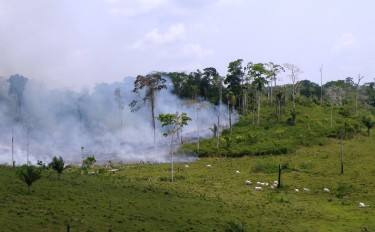Brazil has opened the door to the cultivation of sugar cane for the first time in areas of the Amazon forest and surrounding wetlands and savanna, causing concern among environmentalists.
Federal Bill number 626/2011 [pt], approved by the Brazilian Federal Senate on May 15, 2013, allows sugar cane farming in an area called Amazônia Legal, which comprises the geographical regions of the Amazon forest, the tropical savanna Cerrado, and the swamp land Pantanal.
Despite the bill being limited to areas already deforested and 20 percent of rural properties [pt], the legislation has experts and activists fearful that sugar cane's effect on the wooded areas will be devastating.
Boundaries of Amazonia Legal. Map by InfoAmazonia.org
Members of NGO WWF-Brasil [pt] assert that this will bring no economic or environmental benefits to the region. Experts estimate that a monoculture of sugar cane [pt] will disrupt the ecosystem's biodiversity, will harm the survival of the indigenous and traditional populations, and will extend farming into other areas of the Amazon forest.
Geographer João Humberto Camelini from the Brazilian State University at Campinas analyzed the case in an interview on the website Instituto Humanitas Unisinos [pt]:
(…) esta aprovação é um fato lamentável que demonstra o comprometimento com agentes econômicos, sustentado por um discurso totalmente equivocado. É possível alcançar o desenvolvimento de uma região por meio de um planejamento integrado que envolva, entre outros fatores, a instalação de usinas de açúcar e etanol. Porém, a ideia que se propaga erroneamente é que a mera presença de uma usina conduz ao desenvolvimento.
Quando uma cultura regulamentada como a cana-de-açúcar recebe autorização formal e incentivos para ocupação, isso implica o uso exclusivo de grandes porções de terras no entorno das usinas, dentro de um raio aproximado de 40 a 50 quilômetros, o que leva à rápida e agressiva substituição das atividades existentes, deslocando-as para áreas inalteradas. Isso gera grandes pressões por desmatamentos clandestinos e de difícil fiscalização
(…) this approval is a lamentable fact which demonstrates the compromise with economic agents, sustained by a discourse that is totally wrong. It is possible to achieve the development of a region by means of an integrated plan which involves, among other factors, the installation of sugar and ethanol plants. However, the idea that is erroneously propagated is that the mere presence of a plant leads to development.
When a regulated culture like sugarcane receives formal authorization and incentives for occupation, this implies the exclusive use of large portions of land around the plants, within a radius of approximately 40 or 50 kilometers, which leads to a rapid and aggressive substitution of the existing activities, removing them to unaltered areas. This creates a great deal of pressure for deforestation which is both clandestine and difficult to inspect.
Bill 626/2011 was approved in the Senate in terminative character, which means that only the Environmental Commission voted on the bill. There was no plenary vote in the Senate and the bill proceeded directly to the legislative chamber and the presidency.
Luiz Bento from Science blogs [pt] highlighted why the report was approved in this vertical manner:
Somente os senadores Rodrigo Rollemberg (PSB-DF) e Ana Rita (PT-ES) votaram contra. Você está espantado com isso? Eu não. Sabe quem é o presidente da comissão de Meio Ambiente do senado? O digníssimo senador Blairo Maggi, um dos líderes da bancada ruralista e um dos maiores produtores de soja do Brasil. E você achando que o nosso maior problema era o Feliciano…
And some fear it won't stop with sugar cane. Forestry scientist Paulo Barreto from the Instituto do Homem e do Meio Ambiente da Amazônia (Institute for Man and the Environment in the Amazon, IMAZON), believes [pt] there might be economic pressure for the production of ethanol in the long term:
O problema é se o etanol se tornar uma comodity global. Aí seria negativo pois criaria demanda para desmatar mais, mesmo que indiretamente.
The problem is if ethanol becomes a global commodity. This would be a negative as it would create a demand for greater deforestation, even if indirectly.
According to data [pt] from Reuters, in May 2013 Brazil exported 139.8 million liters of ethanol, a 36.6 percent jump from the 102.3 million liters shipped in April of the same year. The receipt from the fuel sale added up to 93.9 million US dollars in May, a 30.6 percent increase in relation to the 71.9 million US dollars registered in April. However, there was a fall in volume and financial value relative to the same period in the previous year.
On Twitter, environmental experts also criticized the Senate's decision. Geographer Gustavo (@Guveronesi) tweeted:
@Guveronesi: Rumo a virarmos um imenso canavial. “Comissão aprova plantio de cana na Amazônia Legal” http://www.oeco.org.br/salada-verde/2
@Guveronesi: Headed in the direction of becoming an immense sugar cane field. “Commission approves planting sugar cane in the Legal Amazon” http://www.oeco.org.br/salada-verde/2
Ex-Senator Marina Silva (@silva_marina) commented:
@silva_marina: Liberação da cana na Amazônia não tem lógica. outro retrocesso ambiental fruto d barganha política. Meu artigo de hj http://migre.me/eAB9S
@silva_marina: Freeing sugar cane in the Amazon isn’t logical. Another environmental retreat thanks to political bargaining. My article today http://migre.me/eAB9S
Writer Frei Betto (@freibetto) emphasized:
@freibetto: Plantar cana ou soja na Amazônia é decretar o fim da floresta e o início de futuro deserto do Saara no norte do Brasil.
@freibetto: Planting sugarcane or soy in the Amazon is to decree the end of the forest and the beginning of a future Sahara desert in the north of Brazil.
Online petitions against deforestation in the Amazon are attempting to mobilize society. Created by the entity Action B. Brasil, the petition against sugar cane monoculture [pt] has received more than 126,000 signatures. The largest petition on behalf of the preservation of this natural heritage is “Salve a Amazônia!” [pt] (Save the Amazon!), which has already reached more than 2.2 million signatures.










2 comments